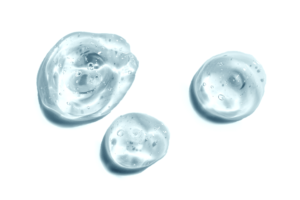Silicones
 Over the years, we have witnessed ongoing disagreement among skincare enthusiasts over the question: Are silicones in cosmetic products good for the skin? Do some or all of them carry the potential for harm? Are they harmless yet ineffective, merely enhancing the feel of creams on our skin? And if that’s the case, isn’t that still a benefit in itself? After all, we all love creams with a pleasant, silky, and smooth texture, don’t we?
Over the years, we have witnessed ongoing disagreement among skincare enthusiasts over the question: Are silicones in cosmetic products good for the skin? Do some or all of them carry the potential for harm? Are they harmless yet ineffective, merely enhancing the feel of creams on our skin? And if that’s the case, isn’t that still a benefit in itself? After all, we all love creams with a pleasant, silky, and smooth texture, don’t we?
What are silicones, what role do they play in creams and serums, and what else should we know about them?
Here’s a review.
Silicones are a group of polymers based on chains of silicon and oxygen with various organic groups. They are common ingredients in skincare products due to their unique properties, particularly in products designed to stay on the skin. In skincare, silicones play a crucial role in providing a smooth texture, improving the feel of creams, and enhancing the stability of cosmetic formulations. Below is an overview of the main silicones used in cosmetic products, their benefits, and their roles in soothing skincare.
Major Silicones Used in Skincare Products:
- Dimethicone
- Benefits: Provides a smooth, silky feel and helps prevent water loss from the skin by forming a protective barrier. It dries evenly without leaving a greasy residue.
- Role: Acts as a moisturizing and protective agent, helping to improve the skin’s texture and sometimes reducing irritation.
- Cyclopentasiloxane
- Benefits: A lightweight silicone that evaporates quickly, leaving the skin feeling soft and refreshed. It is used to create lightweight formulations with a pleasant feel.
- Role: Enhances the spreadability of products on the skin and provides a smooth, silky finish without a heavy sensation.
- Cyclomethicone
- Benefits: A very lightweight silicone that evaporates quickly after application, leaving the skin soft without any oily residue.
- Role: Helps distribute the product evenly on the skin while preventing a greasy or heavy feel.
- Phenyl Trimethicone
- Benefits: More water-resistant than dimethicone, it leaves a slight shine on the skin, making it ideal for products designed to impart a glossy, radiant finish.
- Role: Enhances the sheen and smooth finish of the skin and is often used in both hair and skin care products.
- Amodimethicone
- Benefits: A modified silicone engineered to release moisturizing ingredients in a controlled manner. Commonly used in hair care but also effective in skincare due to its advanced conditioning properties.
- Role: Provides flexibility and enhances the texture of the skin while maintaining moisture levels.
- Silica Dimethyl Silylate
- Benefits: A moisture-absorbing silicone commonly found in products for oily skin, helping to enhance product durability and control unwanted shine.
- Role: Prevents excess oiliness and improves texture, especially in products for oily and combination skin types.
Benefits of Silicones in Skincare Products:
- Skin Protection: Silicones form a thin barrier on the skin that helps retain moisture and protects the skin from environmental stressors.
- Texture Improvement: They provide a smooth, non-greasy feel, making the product more pleasant to apply and wear.
- Irritation Reduction: The protective layer created by silicones helps minimize irritation by preventing water loss and shielding the skin from external irritants.
- Stabilizing Formulas: Silicones help maintain the stability of cosmetic formulations, ensuring they remain consistent over time.
Can Silicones Harm the Skin?
Generally, silicones are considered safe for use in skincare products and are non-comedogenic, meaning they do not clog pores. They are also unlikely to harm the skin in leave-on products. However, there is some debate about whether prolonged use of silicones could “trap” dirt or bacteria under the skin due to the impermeable layer they create. This may be of concern for acne-prone skin, though individual reactions vary.
Differences Between Silicone Families:
The differences between types of silicones lie in their chemical structures. Some silicones evaporate quickly (like cyclopentasiloxane) and do not stay on the skin, while others (like dimethicone) remain on the skin to form a protective, moisture-retaining layer.
Roles of Silicones in Skincare Products:
- Barrier Protection: Silicones prevent water loss and protect the skin from environmental pollutants.
- Texture Enhancement: They make creams feel smoother, silkier, and less greasy.
- Smooth Finish: Silicones provide a soft, even finish on the skin, helping create a polished, refined look.
In summary, silicones play an important role in skincare, especially in leave-on products, as they improve product texture, offer hydration, and create a protective barrier. Most silicones are safe to use, though it’s important to consider skin type and individual reactions.
